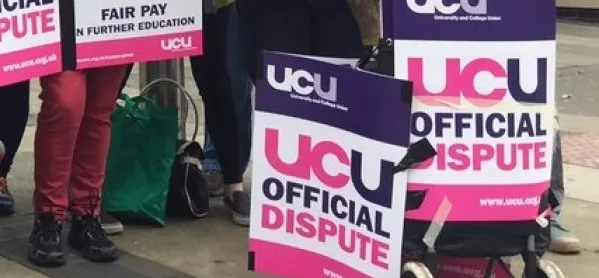Colleges are prepared to offer a “substantial” pay rise for staff - but only if the government agrees to foot the bill.
Representatives from the trade unions representing staff in further education colleges in England today met the Association of Colleges (AoC) to discuss their pay claim for 2018-19.
Last month, the unions submitted a pay claim of 5 per cent for the 2018-19 academic year to the AoC.
The unions also want a guaranteed minimum increase of £1,500 for the lowest paid staff. They are also calling for colleges to pay the living wage of £8.75 (£10.20 in London) and become accredited living-wage employers.
After today’s meeting, AoC chief executive David Hughes said it was “sadly inconceivable for us to make an employer offer which matches other sectors without further government support”.
“It is a well-understood truth that colleges have been hit hard in the austerity decade and simply cannot afford to match other pay awards,” he added. “We are therefore proposing a substantial pay package over two years contingent on government funding. We intend to pursue government for a specific cash injection for pay - to then be consolidated in the 2019 spending review.
Addition funding ‘critical’
“We have called on the unions to work with us to demonstrate to government that additional funding in the sector is now critical. It is not right for the average teacher salary to be £30,000 in colleges, compared with £37,000 in schools. If proper funding is not forthcoming, that gap is likely to widen, making the recruitment and retention of staff even more difficult - particularly in shortage subject areas such as Stem.”
The unions originally set out the claim at a meeting in May but the AoC said it would not discuss a pay claim for 2018-19 while UCU members were still in dispute at some colleges. The deadlock was broken last month after the AoC backed down.
Writing for Tes before the start of the talks, UCU general secretary Sally Hunt also highlighted the pay gap between teachers in schools and colleges.
“Teachers in further education earn around £7,000 a year less than teachers in schools. This sends a hugely damaging message about the value which is placed on further education colleges and the learning they deliver,” she wrote.
“Staff in colleges have seen the value of their pay tumble by over a quarter (25 per cent) since 2009, which means experienced lecturers are now earning over £9,000 less than if their pay had kept pace with inflation.”
Pay in FE is set through national negotiation procedures. At present, the AoC represents its members in negotiations, with the unions representing FE staff - the UCU, NEU, Unison, GMB and Unite. If an agreement is struck, it is then down to individual colleges to decide whether to implement it.
At the UCU national conference, delegates voted to ensure that its branches were poised to conduct strike ballots over pay following the summer break if the AoC failed to make an “acceptable offer”.




